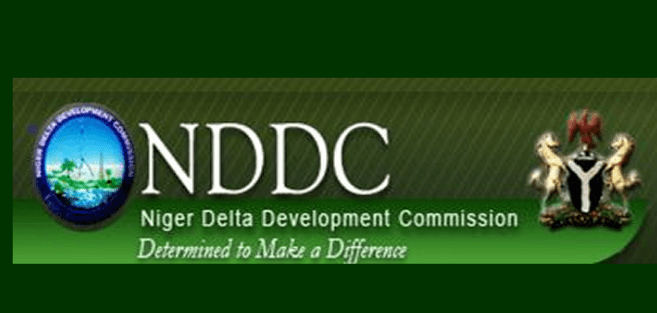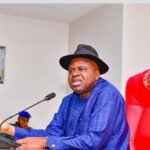The past one week had witnessed another round of avoidable turbulence, featuring the Niger Delta Development Commission (NDDC) at its epicentre. During the week, irate youths operating under the flag of the Ijaw Youth Council (IYC), and numbering in their hundreds, reportedly invaded the premise of the newly completed NDDC headquarters along Eastern By-Pass Road, Port Harcourt Rivers State and occupied it, chanting war songs and dancing, as well as cooking and eating there. As was also reported, a similar protest held at the NDDC office Uyo, Akwa Ibom State. Their grouse is the failure of the Federal Government to constitute a substantive board of Directors for the agency as provided for by law. Expectedly, the protest not only disrupted all official activities of the agency. It also evoked instructive memories of past instances of volatile youth restiveness in the Niger Delta region, which placed at risk, the country’s oil-dependent economy, and for which the agency was set up ab initio, to address.
The protest which was long in the planning and final execution was preceded by a 30-day ultimatum to President Muhamadu Buhari to constitute the board of the agency or face a mass action against the establishment. It, therefore, constitutes an act of desperation by the aggrieved youth of the zone, over certain shenanigans playing out in and around the Commission, now under the control of a Sole Administrator Effiong Akwa, who has unrepentantly manifested unabashed allegiance and subservience to the Minister of Niger Delta Affairs, Godswill Akpabio his former boss. Meanwhile, Akpabio himself had been having brushes over the operations of the agency under the supervision of his ministry, with not a few stakeholders in the affairs of the Commission and the region itself, not to talk of the legislators in the National Assembly with whom he had series of mutually unedifying face-offs in the public domain.
Interestingly, the current protest also featured several twists – most significant of which was the kidnap and release of the IYC President Peter Igbifa, who on gaining freedom disclosed that his kidnap had the imprint of government involvement, as his captors demanded that he should call off the protest action by the IYC. According to him he was unable to accede to their request as mobilization for the protest had commenced on Tuesday last week, before his abduction same day.
His report on his ordeal suggests that whoever kidnapped him had an interest in stalling the protest by the IYC. One question in Igbifa’s abduction then is whether he was kidnapped by state or private sector actors. If it was by private sector actors, they would have been sponsored by desperate interests connected directly to the NDDC. However, if they were state actors, a new dimension would have dawned in Niger Delta politics which features the unabashed deployment of criminality to foster the ends of government officials.
For clarification, the issue of a board for the NDDC had remained hackneyed to a point of near staleness, since the last board was sacked ahead of its terminal point in 2019, after which President Muhamadu Buhari nominated members for a new board who were also duly screened by the Senate. However, instead of swearing them into office as required by law, the President stalled and sidelined them, as he appointed to run the agency, the first batch of ad-hoc administrators under different names, leading to the present situation where the establishment is now run by a Sole Administrator with the corresponding escalation of inanities in its operations.
Several factors have made the delay in the constitution of a board for the NDDC suspect. Firstly is that it was the understanding between the President and a 2019 meeting between him and governors of the NDDC states, that a forensic audit would be conducted in the agency before a new board would be installed. So far the forensic audit has turned out to be an endless exercise leading to unprecedented near corporate meltdown of the establishment as reports emanating from its bowels reek of breaches in operational expedients and procedures from which the agency may hardly recover in a short time, except a substantive board of directors is appointed immediately. And the argument for this is simple. If when the agency was under the full attention of a board of directors with powers to provide checks and balances it had systemic problems, it is easy to imagine the situation where a clique of interim managers or even a sole administrator without adequate checks on their whims and caprices would hold sway.
Secondly, the absence of a board has ushered into the agency a regime of arbitrariness whereby stakeholders and the general public are at a loss over what holds or not in it. The situation has even cast a slur on the integrity of the forensic audit especially with respect to the fact that both Akpabio and Akwa were serving as governor and his aide respectively in Akwa Ibom State during the period covered by the forensic audit.
However on a most cautious note is the need to ensure a speedy resolution of the current IYC protest, which is billed to continue until the Federal government bows to their demands. In a more discerning context, this is hardly a time for the country to tinker with the likelihood of another major oil sector crisis that could originate from the restiveness of the Niger Delta youths. That is if the experience is anything to go by. With a rash of crises hot-spots across the country, an avoidable conflagration the Niger Delta can easily escalate and push the country into crisis-weariness, with attendant dire consequences.
Hence, if the appointment of a board for NDDC is the solution to avoid further crises in the Niger Delta, so be it, as it is hardly a price too big to pay for peace to reign in the region.

 Join Daily Trust WhatsApp Community For Quick Access To News and Happenings Around You.
Join Daily Trust WhatsApp Community For Quick Access To News and Happenings Around You.


